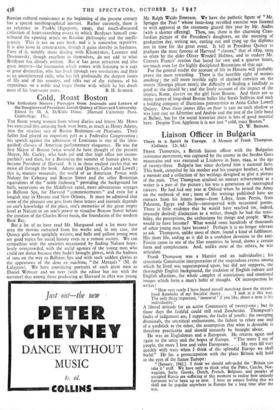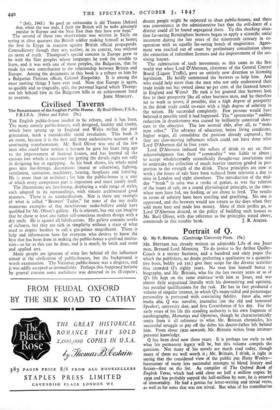Liaison Officer in Bulgaria
FRANK THowsoN, a British liaison officer with the Bulgarian resistance movement, was captured by the enemy in the Sredna Gora mountains and was executed at Litakovo in June, 1944, at the age of twenty-three. Bulgaria has since declared him a national hero. This book, compiled by his mother and his younger brother, is both a memoir and a collection of his writings designed to give a picture of the man. That Thompson attained no mature achievement as a writer is a part of the picture ; his was a generation of interrupted careers. He had had one year at Oxford when he joined the Army on the outbreak of war ; most of the writings published here are extracts from his letters home—from Libya, from Persia, from Palestine, Egypt and Sicily—interspersed with occasional poems. There is little evidence that he would have reached (or, indeed, intensely desired) distinction as a writer, though he had the sensi- bility, the perceptions, the enthusiasm for things and people. What would he have become? What would some hundreds of thousands of other young men have become? Perhaps it is no longer relevant to ask. Thompson, unlike most of them, tound a kind of fulfilment. His short life, ending as it did in a confident devotion to the anti- Fascist cause in one of the Slav countries he loved, shows a certain form and completeness. And, unlike most of the others, he was articulate.
Frank Thompson was a Marxist and an individualist ; his systematic Communist interpretation of the stupendous events among which he lived was superimposed upon, but did not suppress, the thoroughly English background, the tradition of English culture and English affections, the whole ,omplex of associations and emotional images which form a man's habit of thought. Of introspection he writes:
"How very rarely I have found myself marching down the stream- lined Autobahn of my Socialist theory. . . . I look at it this way. The only thing important, `immortal' if you like, about a man is his individuality."
A liberal attitude for an active Communist of twenty-one ; but in those days the faithful could still read Zoschenko. Thompson's faults of judgement are, I suppose, the faults of youth: the sweeping dismissals, the uncritical enthusiasms, the failure to relate one cnd of a yardstick to the other, the assumption that what is desirable is therefore practicable and should instantly be brought about. He was an Englishman and a European. He returns again and again to the unity and the hopes of Europe. "The more I see of people, the more I love and value Europeans. . . . My eyes fill very quickly with tears when I think of the splendid Europe we shall build." He has a preoccupation with the place Britain will hold in the eyes of the future Europe:
" (January, 1942.) I think we should soft-pedal the 'Britain can take it' stuff. We have only to think what the Poles, Czechs, Nor- wegians, Serbs Greeks, Dutch, French, Belgians, and peoples of occupied Russia are suffering at this moment to realise how unjustly fortunate we've been up to now. I have an uneasy feeling that we shall not be popular anywhere in Europe for a long time after the war.
" (July, 1943.) So good an ambassador is old Thomas [Atkins] that, when the war ends, I think the British will be more genuinely popular in Europe and the Near East than they have ever been."
The second of these two observations was written in Sicily on seeing at close quarters the British soldier making himself at home; the first in Egypt in reaction against British official propaganda. Contradictory though they are, neither, in its context, was without its germ of truth. Thompson's special concern in Europe grew to be with the Slav peoples whose languages he took the trouble to learn, and it was with one of those peoples, the Bulgarian, that he made his own contribution to the relationship between Britain and Europe. Among the documents in this book is a tribute to him by a Bulgarian Partisan officer, Colonel Znepolsky. It is among the most moving things I have ever read. Now that Europe is again, so quickly and so tragically, split, the personal legend which Thomp- son left behind him in the Bulgarian hills is an achievement hard



































 Previous page
Previous page